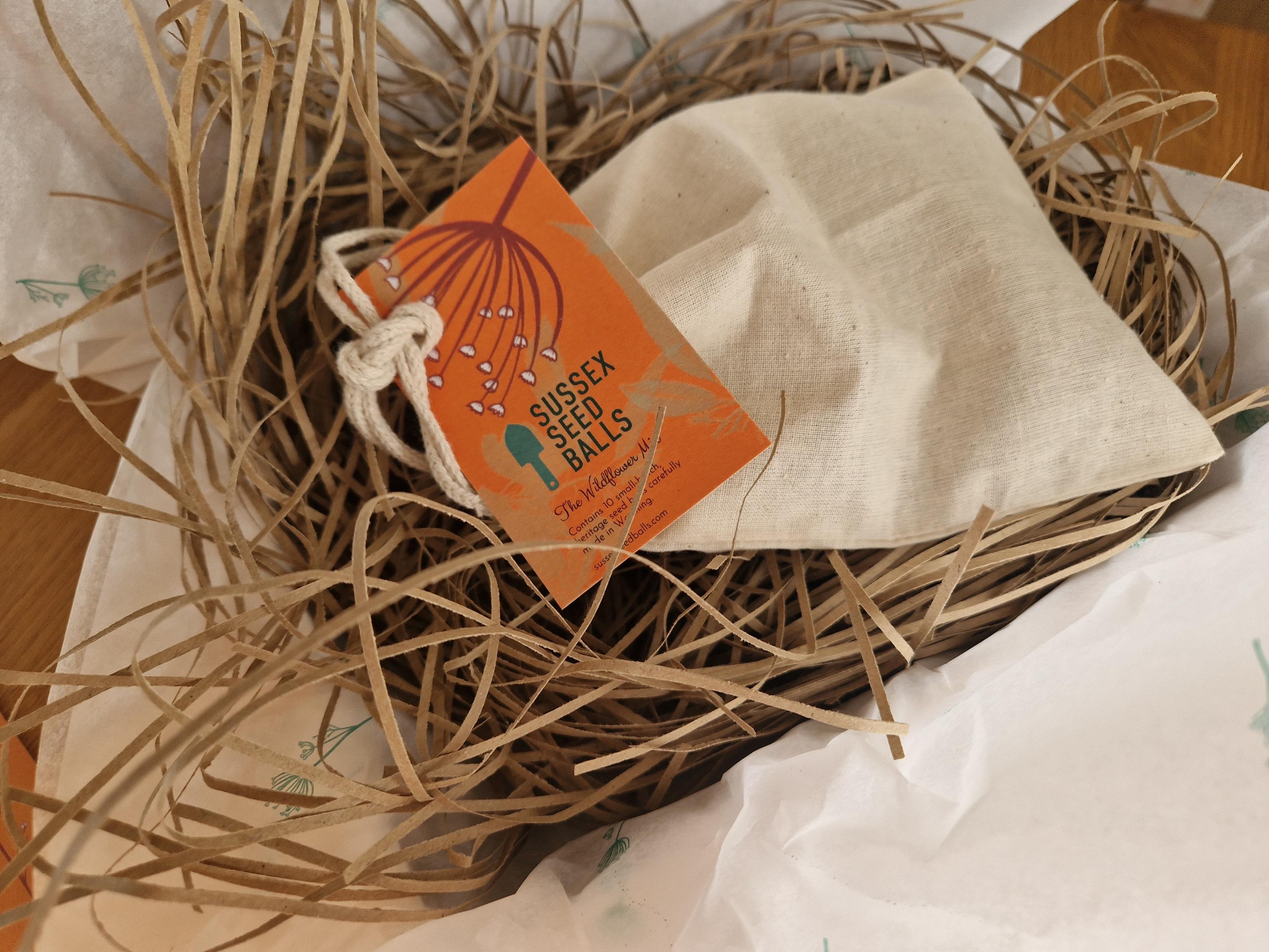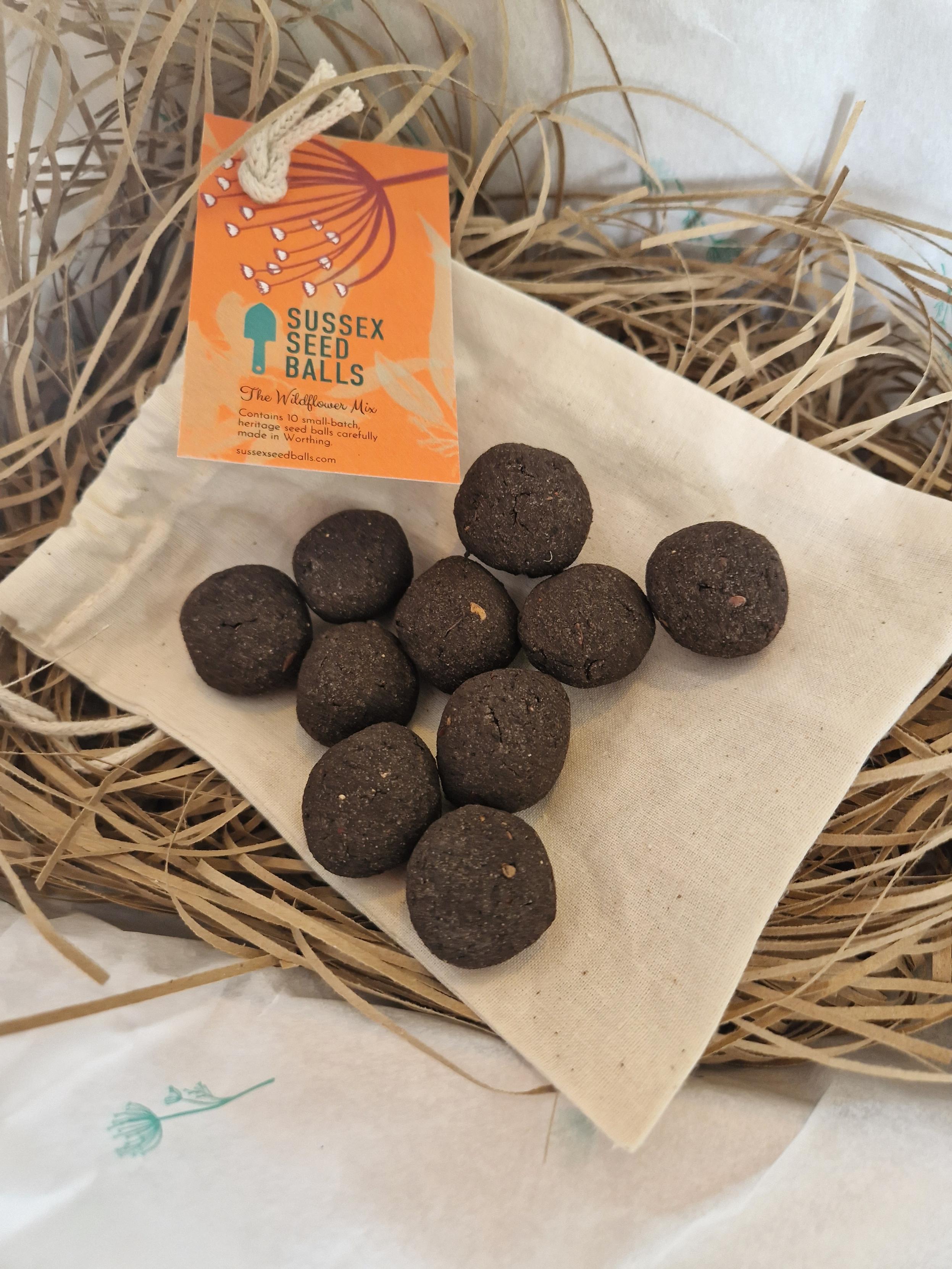


Sussex Seed Balls
10 Wildflower Mix Conservation Seed Balls
📍Crafted in Worthing
We are delighted to introduce you to our very special Wildflower Mix conservation seed balls, celebrating the beautiful Sussex Downlands!
Contents: 10 Wildflower Mix small-batch conservation seed balls, in a cotton bag.
Presented in a cardboard box & styled cardboard sleeve.
Plant in spring & create your own wildflower garden!
Ingredients: Wildflower seed mix, peat-free compost, clay & chilli powder.
Made carefully by hand in Worthing.
Cardboard box & sleeve, tissue paper & twine can be re-used or recycled.
Why Are We Doing This?
At Sussex Seed Balls, we believe wildflowers really, really matter. The more wildflowers we grow, the happier our pollinators - the birds, bees and other insects - will be. They depend on wildflowers for food throughout the year. The WWF tells us that 'on a single day in summer, one acre of wildflower meadow can contain 3 million flowers, producing 1 kg of nectar sugar. That’s enough to support nearly 96,000 honey bees per day.'
Here in Adur & Worthing, we're proud to see that our council are supporting the wildflower movement. You can check out their wildflower map to see some of the green spaces which are benefitting from this activity.
At Sussex Seed Balls, we want to celebrate our bees not just for World Bee Day but every day of the year! We would love to see wildflowers spring up on your patios, in your lawns, your borders and allotments, on our verges and central reservations, in parks and green spaces. By planting our Wildflower Mix conservation seed balls you are helping to rewild our local area.
What's In the Mix?
This is a UK native wildflower variety mix to be planted in spring. It is suitable for all soil types, with different seed varieties in the mix, favouring different conditions. Your flowers will establish themselves in their first year, and reach their best in their second or third years, given good growing conditions.
Please note that seed mix varieties are subject to availability & flower growth is not guaranteed. Seed mix will cover approximately 1m2 per ball.
The mix contains 21 beautiful UK native varieties, but here are five of our favourites:
Common Name: Red Corn Poppy
Latin Name: Papaver rhoeas
Where it thrives: Moist, rich soil, close to the surface
Why we love it: Poppy plants produce beautiful flowers, growing in a range of colours, our favourite being the red-flowered corn poppy. Not only is it a being beautiful & a symbol of those we have lost, the poppy is used for the production of latex, morphine & codeine. Their seeds are also rich in oil, carbohydrates, calcium and protein, and so often used in cooking.
Common Name: Yellow Tansy or Golden Buttons
Latin Name: Tanacetum vulgare
Where it thrives: can grow in full sun or partial shade. It thrives in fertile, well-drained soil & in an area that has little vegetation already established
Why we love it: produces beautiful, yellow, button-like flowers. It has previously had many uses as a medicine (although we do not recommend this!) and continues to be used by traditional dyers to produce a golden-yellow colour & beekeepers use it as fuel in a bee smoker. In addition, it is a great companion plant to cucumber & squash plants, and adds potassium to the soil.
Common Name: Forget Me Not
Latin Name: “Myosotis” from the Ancient Greek for "mouse's ear", which the foliage resembles
Where it thrives: in moist soil with good drainage, in a sunny or shady spot
Why we love it: their flowers are small, with beautiful colours including pink, white or yellow. It is used a symbol by many, including to commemorate those lost in WW1, as well as by various Alzheimer’s organisations around the world.
Common Name: Baby’s Breath
Latin Name: “Gypsophila” from the Greek gypsos ("gypsum") and philios ("loving"), a reference to the gypsum-rich ground in which some species grow
Where it thrives: in dry, sandy and stony places, often in chalk-rich soils
Why we love it: we use gypsum in our seed balls, for nutrient balance, and so it is integral to Sussex Seed Balls. The seeds are often shaped like a snail shell, and we have noticed these seeds when making seed balls, and which resemble fossilised ammonites! These plants are also have many practical uses, including production of photographic film, soap and shampoo, as well as to absorb toxic elements from polluted soils.
Common Name: Blue Lupin or Narrow-Leaved Lupin
Latin Name: Lupinus angustifolius
Where it thrives: full sun or dappled shade, in moist but well-drained soil
Why we love it: these have been cultivated for over 6,000 years as a food crop for their seeds which are rich in protein & energy. Cleverly, the plant is also able to improve soil, fix nitrogen, uses minimal nutrients & the strong roots reduce soil compaction. As a result, the plant is a brilliant way to restore fields depleted by crop rotation.








